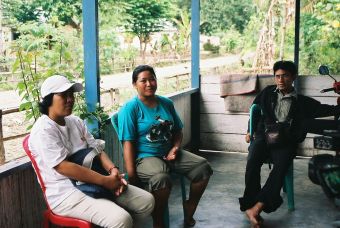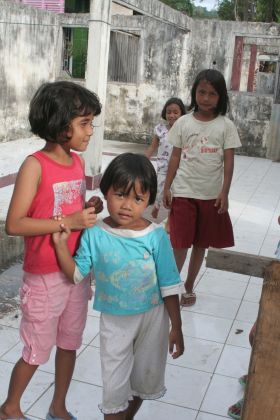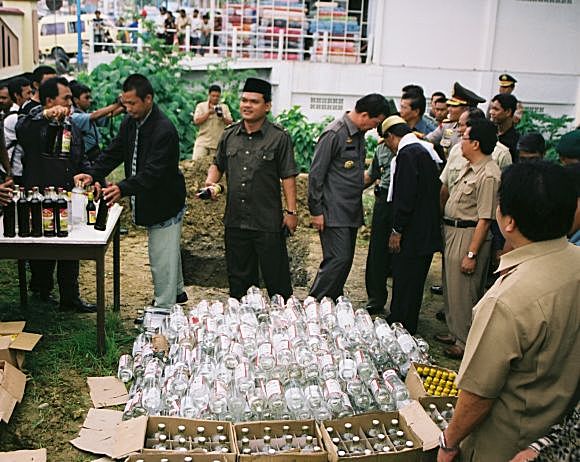Sue Useem
The smashing of alcohol to mark the beginning of the Muslim fasting monthMegan McKearney Inciardi |
The only victim in Poso last Ramadan was the alcohol seized and smashed in front of the police headquarters, then thrown violently into a six foot grave and left there unceremoniously on the first day of the fasting month. In Poso, this kind of act is not just religiously symbolic. It is a way of reasserting police control – something Poso seemed to be without for nearly a decade.
A drunken brawl on 24 December 1998 marked the beginning of the Poso conflict, soon to be overshadowed by more intense violence in Ambon. Like most of the sectarian conflict in Indonesia, Poso’s violence was drawn along religious lines. But it was also the result of disparate political and economic realities in Christian and Muslim communities, driven by dramatic power shifts at both state and community levels.
Poso was nearly destroyed in the process, with most people believing they would never be able to return and re-establish their diverse neighbourhoods and villages. But today Poso is experiencing a grassroots recovery – and perhaps a chance to start over again.
A decade of violence
Poso was engulfed in a series of brutal riots from the drunken brawl in 1998 until the end of 2001. In the single bloodiest incident on 28 May 2000, Christian militias massacred Muslim men hiding at the Walisongo Islamic school and destroyed the adjoining village of Sintuwu Lemba. Three Catholic transmigrants were accused of masterminding the incident. They were sentenced to death after a flawed and poorly managed trial, leading many to conclude that justice had not been served in Poso and that the real masterminds remained at large.
The sectarian violence officially ended after a peace deal was signed in 2001. But all was not well. Muslim civilian militias had formed throughout Poso from 2000, and Jemaah Islamiyah (JI) set up a sub-unit in the Tanah Runtuh neighbourhood of Poso city, recruiting locals, many themselves victims of conflict. Poso was then gripped by a spate of mysterious bombings and shootings, largely targeting Christians. The police were unable to control the endless cycle of revenge. Five years to the day after the Sintuwu Lemba massacre, two bombs devastated the market in Tentena, a Christian majority town in the Poso subdistrict. The timing was no coincidence. A few months later, at the end of Ramadan, the head of a Christian schoolgirl – one of three decapitated – was found in a plastic bag near Sintuwu Lemba.
Investigations led police to Tanah Runtuh. There they discovered that JI members had planned the killing in response to Christian violence. The three convicted Catholic militants were executed one year later for their role in the massacre.
Authorities hoped the execution would calm angry Muslims. It was a naïve prediction, and the violence continued. Again hoping to quell the violence, police descended on Tanah Runtuh in January 2007 after failing to persuade militant Muslims to surrender peacefully. A battle ensued against Muslim militants and their supporters. This was Indonesia’s strongest crackdown to date. Police declared it a success. Many of the militants on the most-wanted list had been killed or captured, or were in hiding, and the JI sub-unit in Poso had nearly been destroyed.
Making sense of the senselessness
Like all of Poso, Sintuwu Lemba is still recovering. Life is difficult for the villagers. Many are still living in burned-out houses with no sanitation, trying to make new lives after being displaced. Aid promised to them has not materialised, and accusations of corruption are rife. But Poso has been remarkably calm since the raids in Tanah Runtuh, and there now seems to be a real chance for peace. Despite the cycle of terror and chaos that engulfed them – and ongoing tensions between religious communities – residents in Sintuwu Lemba have demonstrated a remarkable ability to initiate independent communal reconciliation.
Residents in Sintuwu Lemba have demonstrated a remarkable ability to initiate independent communal reconciliation
The story of one Sintuwu Lemba resident shows why peace is certainly possible. Supriadi, was born and raised in the village. She was three months pregnant when it was surrounded by Christian militias in 2000, and had run into the mountains to hide. Her husband, Daud, later tried to get her to a military camp for shelter, but the militias had set up road blocks and they were unable to pass. Trapped by the violence, Supriadi and Daud were forced to sleep in a neighbouring village, and in the morning Daud was gone. His body was never found. Supriadi and her family spent the next few years moving around displaced persons camps in South and Central Sulawesi, long after the sectarian violence had dissipated, convinced they could never go back. They changed their minds and decided to come home in 2005.
 |
Supriadi at her new home with Dina, a translator, and Daud, a local
|
Supriadi sat casually chatting with a Christian journalist, a Christian peace activist and a Christian translator the day she watched the police smash the alcohol. As she introduced herself to us, she was quick to point to the harmony in her village between Christians and Muslims. Our Christian translator, Dina, agreed that there was no lingering distrust between the two communities. Dina’s own family had fled Poso in 2000 after their neighbourhood was attacked in reprisal killings. Both women said they held no ill-feeling against community members of the other faith.
The complexities of the conflict made little sense to either of them. They did not know why the men were killed at the Islamic school, why their houses were burned down, or who did it. Revenge had never occurred to them. When the Indonesian government executed the three men they had found responsible for the massacre at Sintuwu Lemba, it meant little to Supriadi because she didn’t know if they had been responsible for her husband’s death. Supriadi knows nothing of the Indonesian legal system, and the execution did not make her feel any safer. In fact, she ran to a police post with her Christian neighbours when she heard about the execution, fearful that new violence would break out.
A chance for a new Poso
 |
Children play in burnt-out abandoned houses in Poso CitySue Useem |
Supriadi has a rash on her hands from the pesticides with which she comes in contact while picking water spinach for pig food, her sole source of income. This economic activity exemplifies Poso’s long-held motto, ‘Sintuwu Maroso’, which refers to the strong sense of unity and communal aid between the different religious communities – a sense nearly destroyed by the sectarian fighting. She has also joined a multi-faith common financial pool for women, and works with her Christian neighbours to clean up the village.
Many NGOs and the police are scrambling to create programs to do what Supriadi has done spontaneously. Renewed economic collaboration between Christians and Muslims is essential for rebuilding trust and re-establishing the historically strong ties between the communities in the markets, fields and work places where Muslims and Christians continue to interact. Since much of the communal violence had its roots in growing economic inequality, strong competition, and distrust between the Muslims and Christians, they hope that more economic equilibrium between Muslims and Christians will help to maintain the peace.
When Supriadi first returned to Sintuwu Lemba, she was afraid to work in the fields with Christians. Now, she is more worried about the rash than about her Christian neighbours, and asked us to send her some medicine. Supriadi is happy with her life, and happy to be home. She talked positively of the future of her son and of the village. What is most encouraging is that Supriadi’s story and outlook is not unique. Although communitarian tensions persist, many agree that the only way to look is forward now that it seems the cycle of revenge is over. ii
Sue Useem (sluseem@yahoo.com) is a producer and broadcaster for the Indonesian Service at the Voice of America (VOA) in Washington D.C., a freelance videographer, and the producer of an upcoming documentary about the Poso conflict entitled ‘Which Way to the War?’
